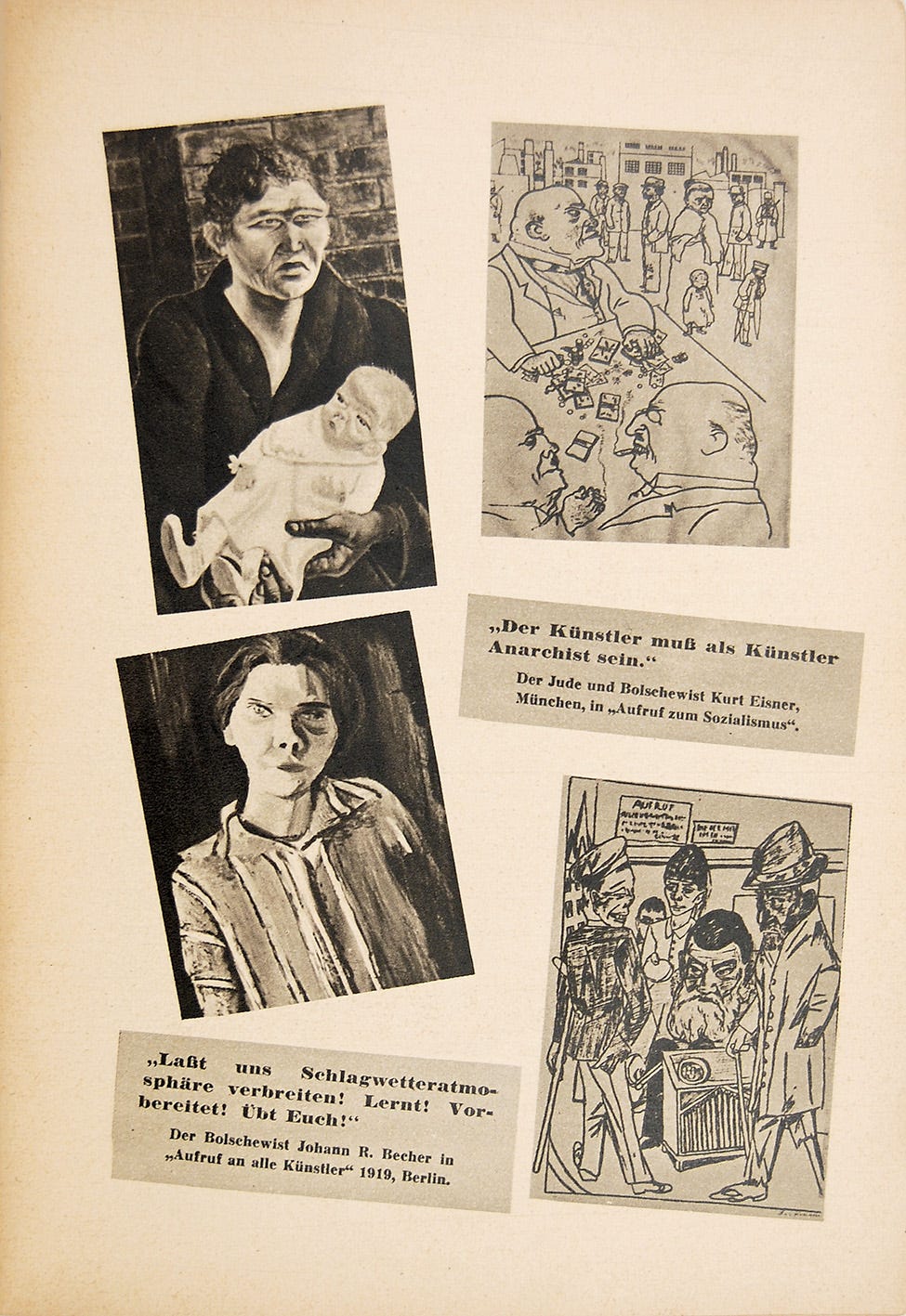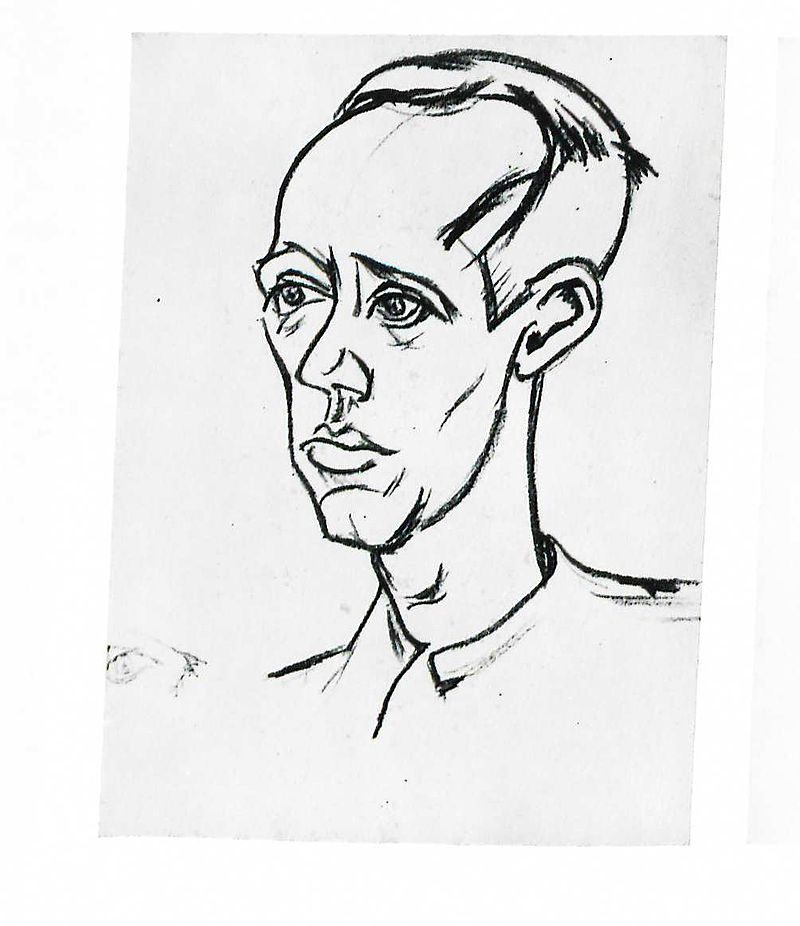
Fourteen of Johannes Robert Becher’s poems appear in the 1919 Menschheitsdämmerung (“Twilight of Humanity”) anthology of German Expressionist poetry—a surprising fact, perhaps, given that the writer would soar to such political and literary heights as most of his colleagues, or indeed as most poets in any time or place, could never dream. Becher’s poem “Decay” (“Verfall”), published earlier in his own 1914 collection of verse titled Decay and Victory (“Verfall und Triumph”), is the 4th poem that appears in the 1919 edition of Twilight of Humanity.
An ardent political activist and Communist Party member for most of his life, Becher fled Germany in 1933 after the Nazi government raided an artists’ colony in which he was staying near Berlin. In the 1920s, Nazism was gaining strength rapidly—but so was Becher’s belief in putting up violent resistance to stop it. The fiery young poet joined the antifascist Roter Frontkämpferbund, or "Red Front Fighters' League,” a paramilitary of uniformed radical leftwing fighters who were determined to fight fire with fire and counter Nazi violence with equal, if not greater, violence to keep it from gaining control of German society.
But we get ahead of ourselves.
An in-depth biography of Becher is far beyond the scope of this entry. Indeed, it would be hard to fit all the details of his extraordinary life into any kind of single biopic, as varied and complicated as it—and he—was. Reading over many of his biographical details, sometimes it’s hard not to conclude Becher wasn’t just a big hot mess of a human (if I can put it bluntly)—as his life—which includes murder, suicide attempts, street brawling, revolution, and eventual ascendancy to government—reads like the lives of poets in centuries gone by, not the life of a 20th-century statesman.
I’ll let the following excerpt from poet William Seaton’s blog entry about Johannes R. Becher, at his excellent Poetry on the Loose blog, tell you what I mean. Apologies for this long quote, but I feel it necessary to impress upon readers just how unbelievably stormy—or is that “colorful”?—Becher’s life was:
At the age of nineteen [in 1900], [Becher] participated in a last gasp of German Romanticism by entering a suicide pact (he did admire [Heinrich von] Kleist) with his lover [Fanny Fuss], whom he killed with a bullet, though he only wounded himself. His first book Die Gnade eines Frühlings (“The Grace of Springtime”; 1912) contains thoroughly Romantic poems. While coping with morphine addiction he associated with Futurist and Expressionist groupings in the art world and with revolutionary organizations such as the Spartacist League and then the Communist Party in politics. His pacifist novel, (CHCI=CH)3As (Levisite) oder Der einzig gerechte Krieg was banned in 1925 and he was indicted for "literarischer Hochverrat" or "literary high treason.” And that was under Weimar. When the Nazi regime took over, he escaped arrest by going into hiding, then making his way to the Soviet Union where he likely found he had little choice and eventually declared his adherence to the socialist realism of Zhdanov. Implicated in the purges of suspected Trotskyites, he informed on others, then suffered depression and attempted suicide again. After the war he returned to the eastern zone of Germany to accolades as the great poet of the new era. He was made Minister of Culture in 1954. His business had become the suppression of young dissidents such as he himself had once been. He wrote the national anthem of the German Democratic Republic. In his memoirs, unpublished until thirty years after his death, he renounced not just his service to the East German Stalinist government but to socialism itself as the great mistake of his life.
Unlike several of his Expressionist colleagues—including, even, some of his fellow contributors to the Twilight of Humanity anthology—some of whom would end up dying under the Nazi regime—Becher lived through Nazi persecution and the horrors of World War II to see his homeland once more.

By then, the victorious Allied countries had partitioned Germany into East and West. It was here, in the newly-formed, pro-Russian East Germany that Becher actually prospered. His loyalty to the Soviet Union was richly rewarded in the nascent Soviet satellite state, and Becher was able to effect some cultural good: he founded the Aufbau-Verlag publishing house, the Sinn und Form literary magazine, and he helped found the Berlin Academy of Arts, an institute that still exists and does good work. From 1955 until 1958 Johannes R. Becher became a member of East Germany’s Council of Ministers, one of the primary governing bodies of the country. It was in accord with this that he was made the presiding Minister of Culture, as well. He also wrote the lyrics for East Germany’s national anthem in 1949, just as he had written the words for the “Red Flag Oath” of the Rotfrontkämpferbund (RFB) paramilitary streetfighters in 1925.
In Europe, it was once not uncommon for heads of state to have backgrounds as accomplished writers or poets, even if those backgrounds included avant-garde or oddly artsy/highbrow literary dalliances. Just look at Vaclav Havel, poet and playwright, who served as Czechoslovakia’s President from 1989 until 1992 and who then became the first President of the Czech Republic, an office he kept from 1993 until 2003. The poet Michael D. Higgins currently (2024) serves as the President of Ireland.
From persecuted avant-garde poet to official cultural leader of an entire nation, Becher’s life bounced between radical extremes. As most scholars tell it, he could never escape the guilt he felt for killing his lover in a suicide pact gone awry (shades of William S. Burroughs and Joan Vollmer here), and as his diaries attest he eventually regretted signing on to the Communist program, too.
Here is “Decay,” by Johannes R. Becher, poem number 4 in Twilight of Humanity:
DECAY (1914)
by Johannes R. Becher
Our bodies decompose,
Entombing ourselves, all the while singing
In intoxicated evenings
Buried by night-storms and seas.
Hot blood dries up,
Pus-filled ulcers drain.
Mouth, ear, and eye are veiled by
Sleep, dream, earth, and the wind.
Yellowish sluggish worms
Are tightly wound in a passage.
Pounding of rolling storms.
Eyelashes, blood-red, long.
. . . "Am I a crumbling wall,
A silent pillar by the wayside?
Or am I a tree of mourning
That leans over the abyss?" . . .
Sweet smell of decay
Filling room, and house, and head.
Flowers, fluttering grasses.
Birds, songs, welling up.
"Yes—rotten trunk..."
Mold. Groaning. Moaning.
Under a teeming sky, flight.
A terrible sound rings out:
A kettledrum. The tuba's drone.
Thunder. Wild-flaming light.
Cymbal. Striking tone.
The drum's shriek.
That shatters.—
I who gave myself to you, wide world,
Easily trusting.
See, the poor body decays
But my spirit sees its homeland.
Night, your slumber comforts me,
Mouth rests deep and arm.
Bright day, you dissolve me
Into restlessness and sorrow
From which I find no way out.
Ah, so painfully divided!
Soon radiant, soon blind and bound
That no kiss heals me!
That I find no way out,
Perhaps I alone am to blame:
Torrent, blood, and fire-wind,
Shame, impatience.
Day, you bitter hardship!
Night, give dream and counsel!
Excrement, distortion, cut and tear—
Cool resting place...
Everything must still be far away,
Far, oh far, from me—
Bloom upwards in the starlight,
Homeland, above me!
Once I will stand by the wayside,
Lost in thought, gazing at the Great City
And surrounded by shining winds.
Light falls but dimly through clouds that retreat.
And there are rapturous figures clothed in white...
My hands touch
The heavens, filled with gold,
Opening like wondrous doors.
Meadows and great forests rise up.
Waters roll. There are bridges.
The great ceiling above it all!
And rivers are endless in their courses.
The grey mountains' ridge.
Red thunder peals terribly.
Dragons spewing out the earth.
Through torn open jaws, the sun roars.
Revolt. Laughter. Screaming.
Eclipse. Taste of earth and blood.
Struggle. Slaughter far and wide...
. . . "When will you appear, eternal day?
Or is there still time?
When will you sound, trumpets of heaven?
The cry of the enormous sea's tide?
From thicket to moorland, from grave and thorn,
Calling those who are asleep?" . . .
Translation copyright © 2024
This is Johannes R. Becher’s “Verfall” (“Decay”) as it appears in the original German:
VERFALL (1917)
by Johannes R. Becher
Unsere Leiber zerfallen,
Graben uns singend in:
Berauschte Abende wir,
Nachtsturm- und meerverscharrt.
Heißes Blut vertrocknet,
Eitergeschwür verrinnt.
Mund, Ohr, Auge verhüllet
Schlaf, Traum, Erde, der Wind.
Gelblich träger Würmer
Enggewundener Gang.
Pochen rollender Stürme.
Wimpern, blutrot lang.
. . . „Bin ich zerbröckelnde Mauer,
Säule am Wegrand, die schweigt?
Oder Baum der Trauer,
Über den Abgrund geneigt?“ . . .
Süßer Geruch der Verwesung,
Raum, Haus, Haupt erfüllend.
Blumen, flatternde Gräser.
Vögel, Lieder, quillend.
„Ja —: verfaulter Stamm . . .“
Schimmel. Geächz. Gestöhn.
Unter wimmelnder Himmel Flucht
Furchtbarer Laut ertönt:
Pauke. Tubegedröhn.
Donner. Wildflammiges Licht.
Zymbel. Schlagender Ton.
Trommelgeschrill. Das zerbricht.—
Der ich mich dir, weite Welt,
Hingab, leicht vertrauend,
Sieh, der arme Leib verfällt,
Doch mein Geist die Heimat schaut.
Nacht, dein Schlummer tröstet mich,
Mund ruht tief und Arm.
Heller Tag, du lösest mich
Auf in Unruh ganz und Harm.
Daß ich keinen Ausweg finde,
Ach, so weh zerteilt!
Blende bald, bald blind und Binde.
Daß kein Kuß mich heilt!
Daß ich keinen Ausweg finde,
Trag wohl ich nur Schuld:
Wildstrom, Blut und Feuerwind,
Schande, Ungeduld.
Tag, du herbe Bitternis!
Nacht, gib Traum und Rat!
Kot, Verzerrung, Schnitt und Riß—
Kühle Lagerstatt . . .
Alles muß noch ferne sein,
Fern, o fern von mir—
Blüh empor im Sternenschein,
Heimat, über mir!
Einmal werde ich am Wege stehn,
Versonnen, im Anschaun einer großen Stadt.
Umronnen von goldener Winde Wehn.
Licht fällt durch der Wolken Flucht matt.
Verzückte Gestalten, in Weiß gehüllt . . .
Meine Hände rühren
An Himmel, die von Gold erfüllt,
Sich öffnen gleich Wundertüren.
Wiesen, Wälder ziehen herauf.
Gewässer sich wälzen. Brücken.
Gewölbe. Endloser Ströme Lauf.
Grauer Gebirge Rücken.
Rotes Gedonner entsetzlich schwillt.
Drachen, Erde speiend.
Aufgerissener Rachen, die Sonne brüllt.
Empörung. Lachen. Geschrei.
Verfinsterung. Erde- und Blutgeschmack.
Knäuel. Gemetzel weit . . .
. . . „Wann erscheinest du, ewiger Tag?
Oder hat es noch Zeit?
Wann ertönest du, schallendes Horn,
Schrei du der Meerflut schwer?
Aus Dickicht, Moorgrund, Grab und Dorn
Rufend die Schläfer her?“ . . .
This is Twilight of Humanity: German Expressionist Poetry in English.
All content above, unless otherwise indicated, is copyright © 2024 Oliver Sheppard.






